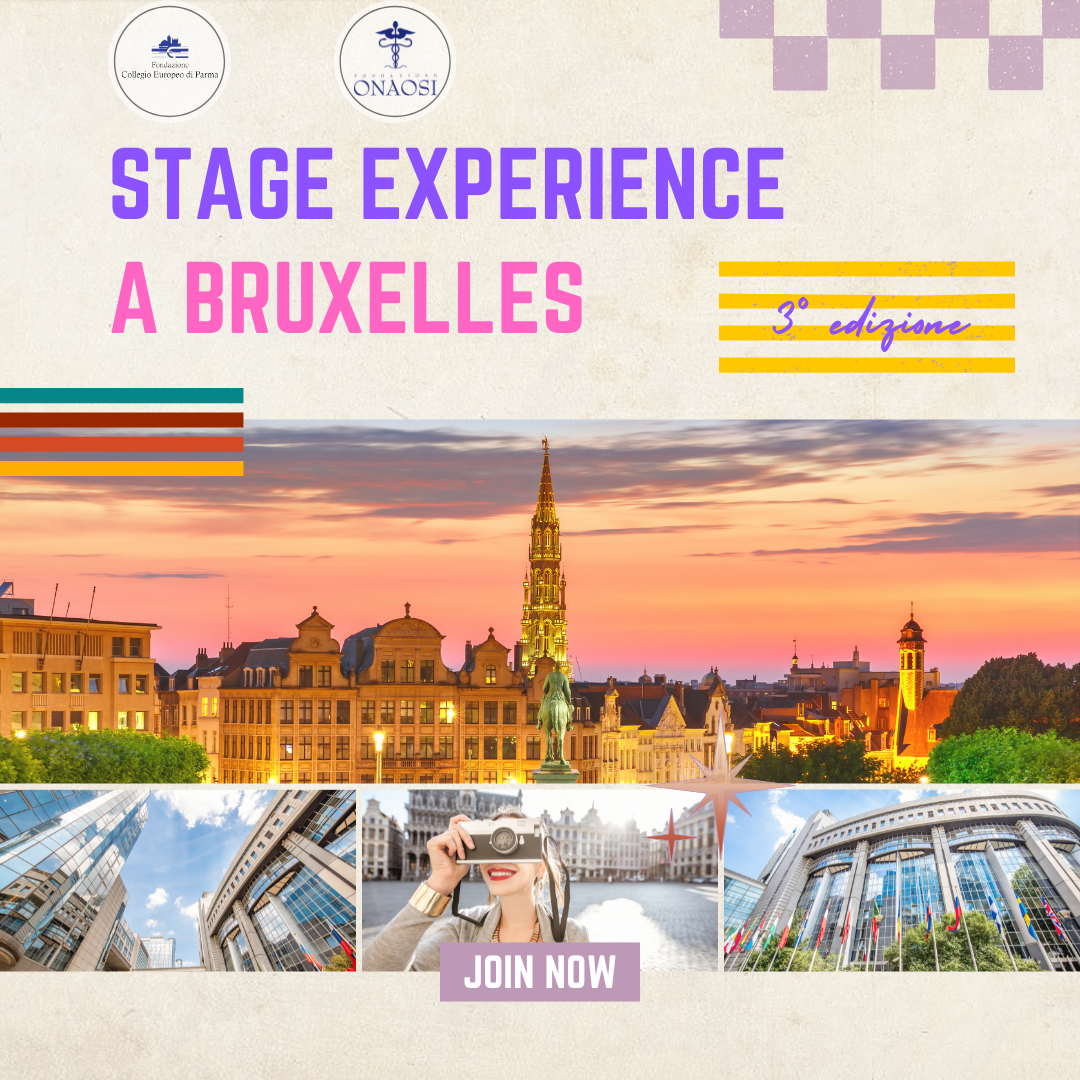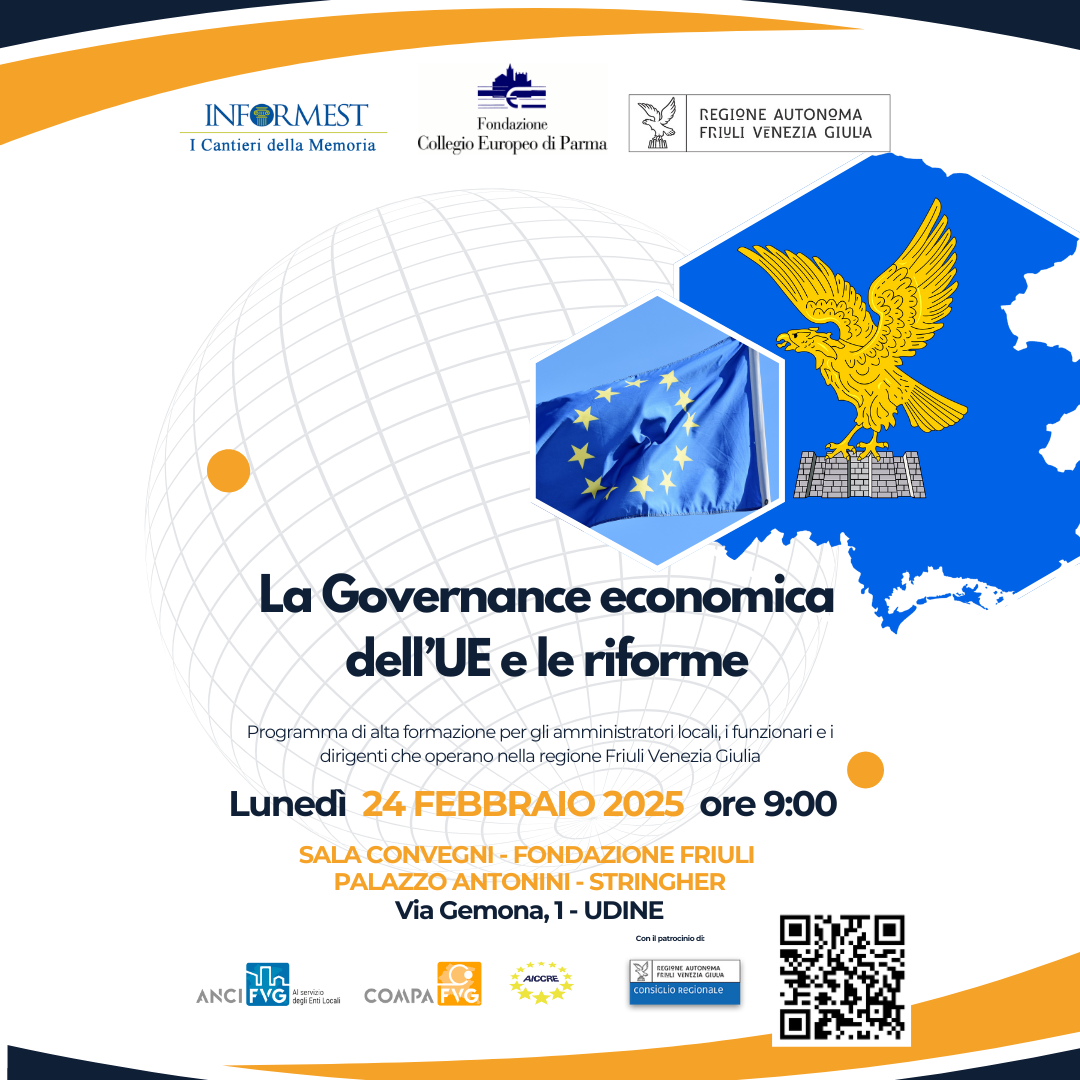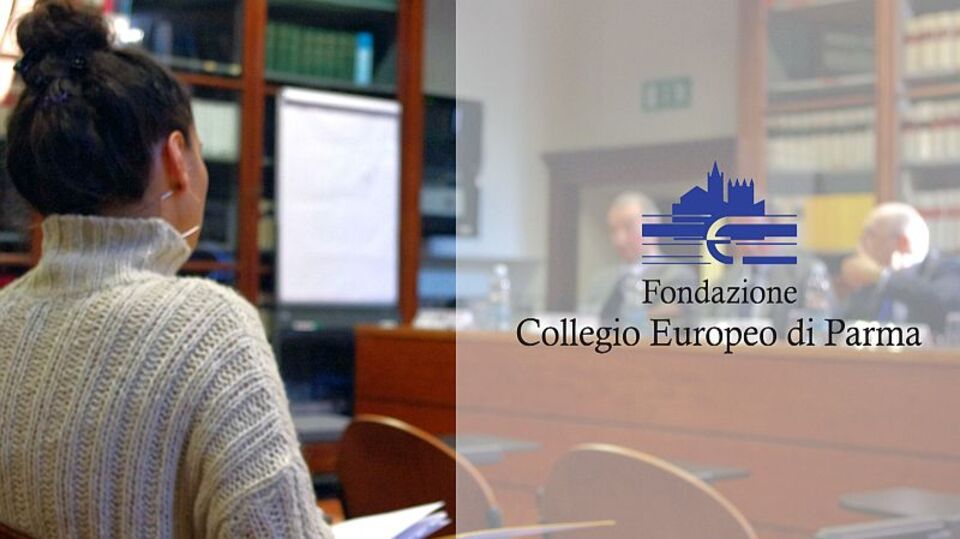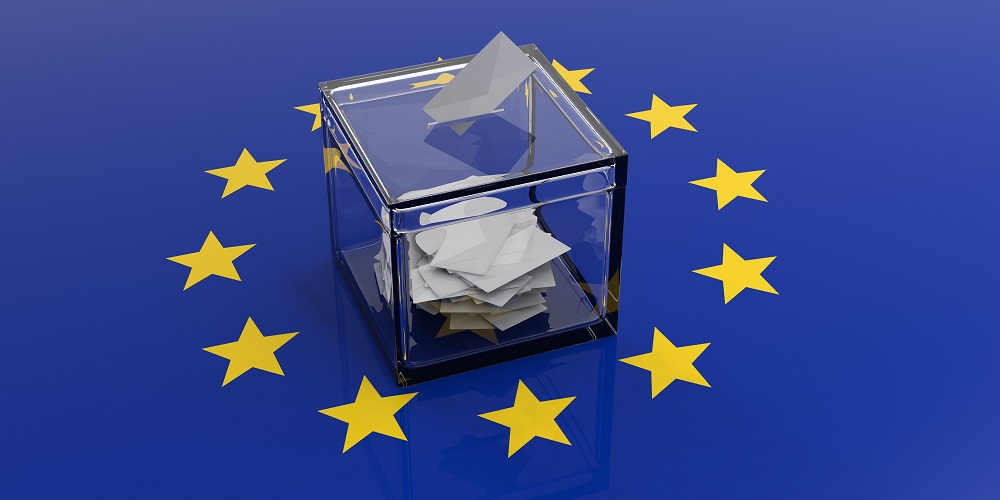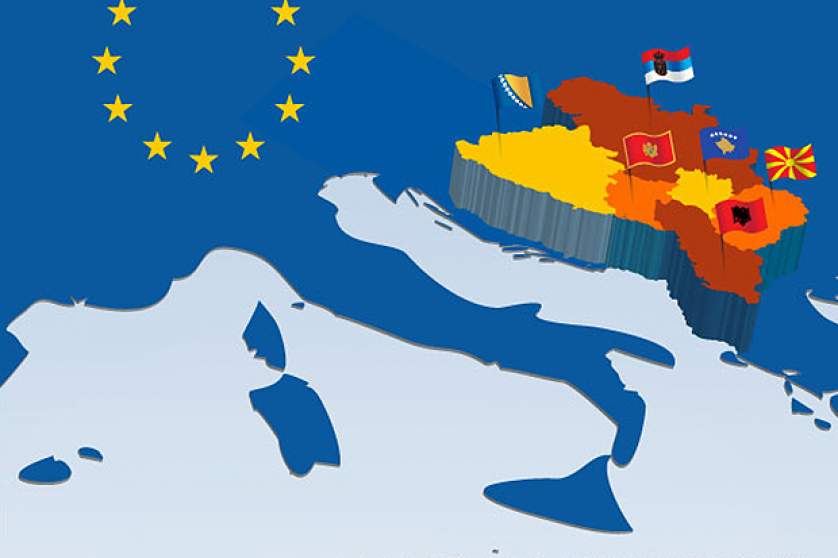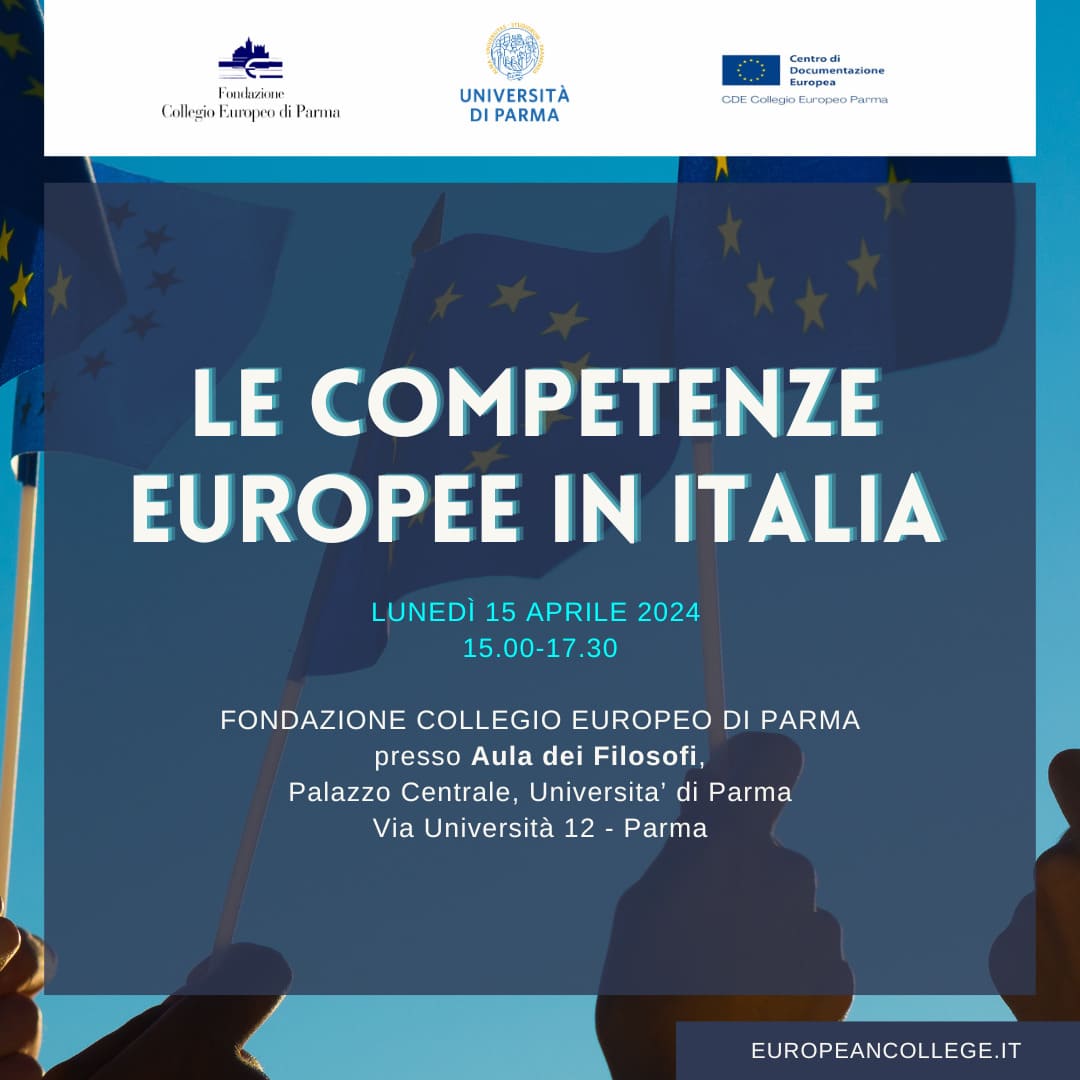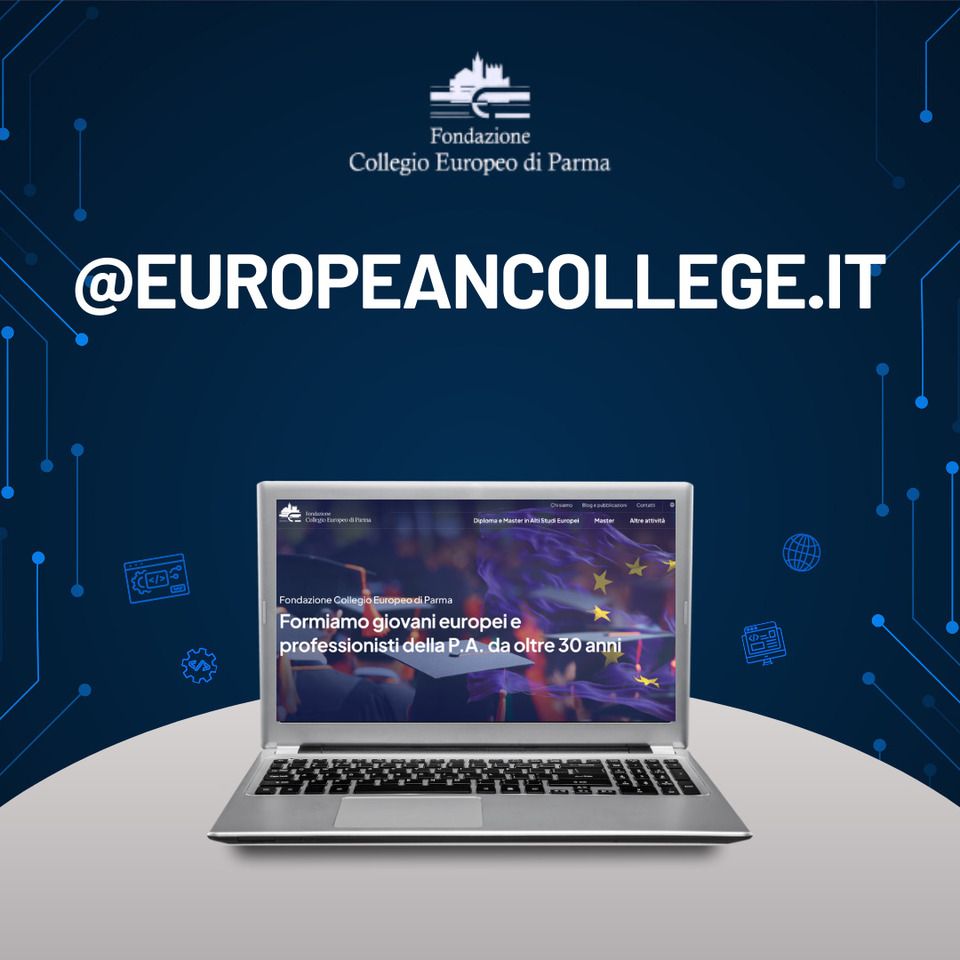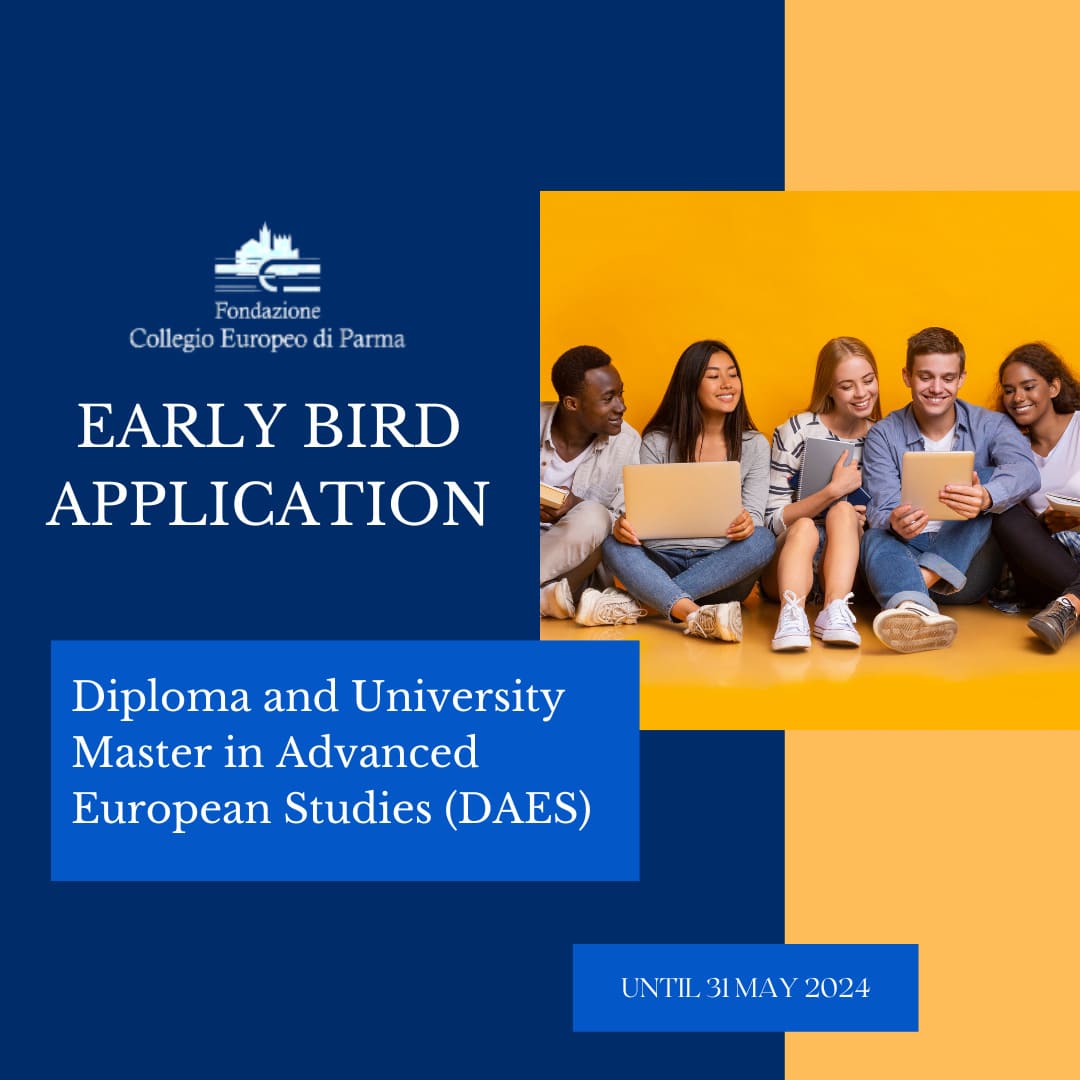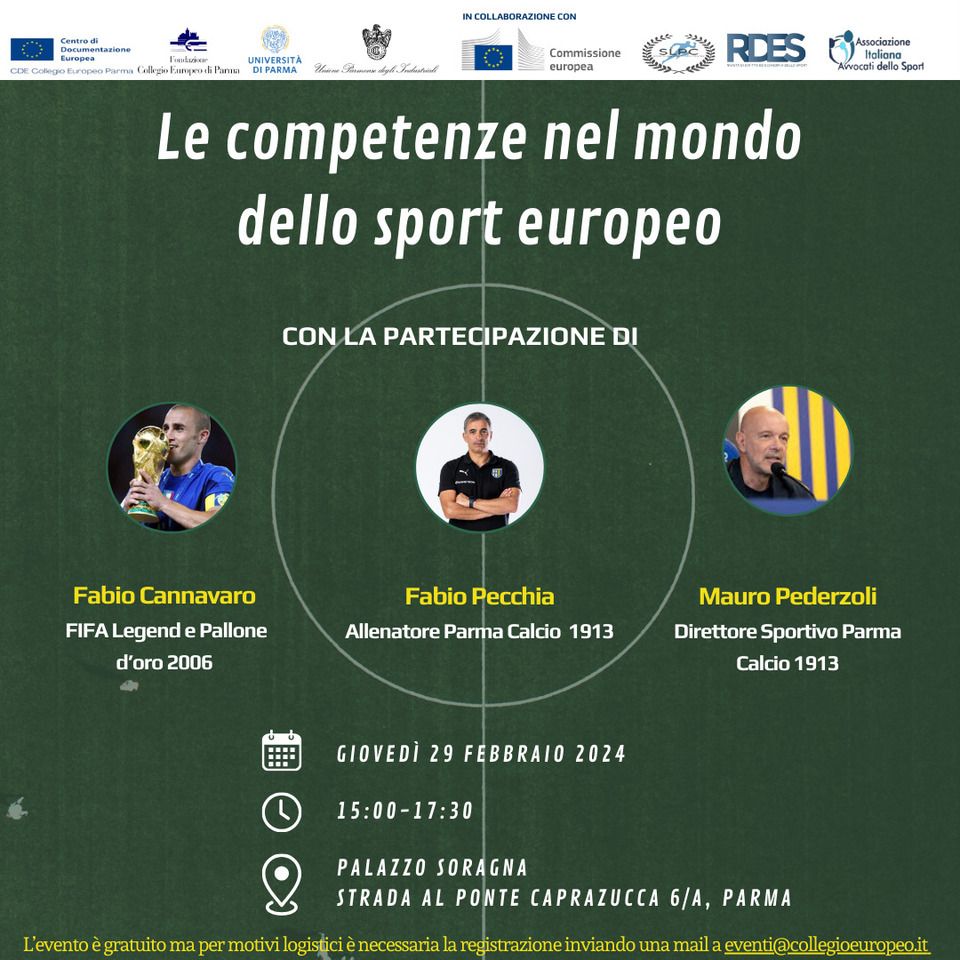Author: collegio
Alta formazione sulle politiche UE: il 24 febbraio a Udine il secondo seminario sulla governance economica
Prosegue il ciclo di alta formazione sulle politiche dell’Unione Europea, promosso dalla Regione Friuli Venezia Giulia e organizzato da Informest, con il supporto di ANCI FVG, COMPA, AICCRE e la collaborazione della Fondazione Collegio Europeo di Parma, sotto il patrocinio del Consiglio Regionale.
Il secondo incontro, dal titolo “La Governance economica dell’UE e le riforme”, si terrà il 24 febbraio 2025 alle ore 9:00 a Udine, presso la Sala Convegni – Fondazione Friuli, Palazzo Antonini-Stringher, in Via Gemona, 1. L’incontro, alla presenza dell’Assessore Regionale alle Finanze Barbara Zilli, approfondirà le dinamiche della governance economica dell’Unione Europea e le implicazioni delle recenti riforme, che mirano a promuovere la sostenibilità del debito, offrendo strumenti utili per affrontare le sfide macroeconomiche e favorire una crescita inclusiva.
L’iniziativa fa parte del programma “I Cantieri di Gianni Bravo” e comprende un ciclo di 10 seminari mensili su temi cruciali per il futuro del territorio, come sostenibilità, politiche urbane e rurali, sicurezza alimentare, formazione, salute e infrastrutture. L’obiettivo è rafforzare la partecipazione del Friuli Venezia Giulia nelle decisioni europee e migliorare l’accesso ai fondi UE.
Ai dipendenti regionali saranno riconosciuti crediti formativi previa partecipazione e superamento di un test finale.
La partecipazione è gratuita, previa iscrizione, compilando il modulo disponibile al seguente link: https://forms.office.com/e/7Psuk8e11T.
Scholarships for DAES 2024/2025
The call for applications for scholarships/fee reductions for DAES is now open!
The European College of Parma Foundation is offering the opportunity to apply for scholarships consisting in reductions of the DAES course fees.
The following Scholarships (i.e. reductions on course fees) are made available:
- 10 Scholarships, consisting in a reduction of € 2000 from the Standard Fees, addressed to citizens of the European Union whose household income (ISEE or equivalent) is lower than € 27000.
- 10 Scholarships, consisting in a reduction of € 2500 from the Standard Fees, addressed to citizens of Countries which are Candidates to accession to the European Union (i.e. Albania, Bosnia and Herzegovina, Georgia, Moldova, Montenegro, North Macedonia, Serbia, Türkiye and Ukraine), with a household income (ISEE or equivalent) that is lower than € 35000.
- 5 Scholarships, consisting in a reduction of € 2500 from the Standard Fees, addressed to citizens of Non-EU Countries, with a household income (ISEE or equivalent) that is lower than € 35000.
Download the specific Call for Applications to know all details on terms and conditions for applying!
Apply now: first deadline is 2 August 2024; second deadline is 2 September 2024.
Scholarships will be awarded until available funds are exhausted.
IMPORTANT NOTICE: Deadline for scholarship applications is extended to 20 September 2024.
European elections and the appointment of the President of the Commission
Alfredo De Feo, Scientific Director of the european college of Parma foundation
One of the central issues of the upcoming European elections is the appointment of the next President of the Commission. The candidate proposed by the European Council, taking into account the results of the elections, should be appointed by the European Parliament.
Since 2014, to reinforce the link between candidates and elections, the European parties have been appointing their candidates for the Presidency of the Commission (lead candidates). The candidates have then presented their vision of Europe and their responses to transnational challenges.
These debates are certainly interesting, as they force the candidates to present their ideas and their recipes, but they still have a great limitation: they do not attract the attention of public opinion in the various countries. Firstly, there is a language barrier, which is difficult to overcome, and secondly, the leaders of national parties have little motivation, especially when they are candidates, to put forward the candidate of the European party to which they are affiliated.
The European Parliament had put forward a proposal, supported by the most federalist circles, to create a single transnational constituency where each European party would present a single list with its own single candidate. In this way, the leading candidate of the party with the most votes would have a popular investiture, a kind of European premiership.
In reality, there is another limitation, the absence of a single electoral system, each country organizes its elections internally as it sees fit. In addition, proportional voting certainly makes the European Parliament representative of national public opinion, and this is a good thing, but not necessarily suitable for electing the best candidate for President of the Commission, whose main quality should be his/her capacity of mediator between the ‘Senate’ (national governments) and the lower house (the European Parliament).
The future President of the Commission must, however, have the ability to coalesce a parliamentary majority, probably making concessions to the right and the left, only in this way he/she will be able to have a majority in the European Parliament, a majority that could lose during the term of office, in case the motion of censure is activated, as it happened, in 1999 with the Santer Commission.
The best example of the Commission President’s ability to compromise came in 2019. Ursula von der Leyen was not among the Leader candidates expressed by the European parties, but none of them had the necessary parliamentary majority to be elected. The European Council nominated Ms von der Leyen, who was confirmed by only nine votes. After that, she negotiated her government programme with the parliamentary groups after the elections, obtaining a solid parliamentary majority.
To conclude, as it is often the case in Europe, the ideal solution is not achievable and remains a goal, but there is (almost) always a sub-optimal solution that advances the democratic process and European integration.
In previous years, the President of the Commission was formally appointed by the European Council. In practice, the appointment took place in a private room of the Council, or more often in a small room in some hotel between two or maximum three Heads of State, you can guess the names! The Treaty of Lisbon put an end to this practice and the European Parliament, with the majority that will emerge from the ballot box, has a decisive role. The citizens’ vote will have an important influence on the future of Europe.
EU Enlargement and Neighbourhood Policy with a focus on the Western Balkan countries
Dejan Kralov, DAES alumni
The topic of the European Union enlargement is one of the most relevant and significant issues facing the Union, particularly in times of war and destabilization in Europe mainly caused by the Russian aggression against Ukraine. The EU’s enlargement and neighborhood policy play a crucial role in shaping the future stability, prosperity, security and progress of both the European Union and the entire European continent. By expanding the zone of peace and development, the European Union extends its presence and influence, striving to become the most influential global power. However, the thesis elaborates how the requirement for unanimous decisions within the EU poses one of the main obstacles for achieving the above-mentioned future challenges. Additionally, the thesis advocates for introduction of clear reasons due to which a certain EU candidate country can be vetoed in order to establish a more democratic, effective and efficient membership process without blackmails, within a strengthened and united EU accessible equally to all European countries. It is a fact that we have witnessed quite unprincipled blockades without competent, democratic and legitimate reasons for veto by compromising the Copenhagen criteria and EU treaties, while interfering in the candidate countries’ sovereignty, which is uncharacteristic for the European Union. Moreover, the thesis focuses on the Copenhagen criteria, essential benchmarks that must be met by candidate countries to progress in the accession process. They indicate if the candidate countries are politically, economically, and legally prepared in the accession process, while emphasizing that bilateral issues must not be a reason for veto according to EU treaties. However, this is not the case in reality, where such bilateral issues often take precedence. Such inappropriate vetoes, as the current Bulgarian veto of Macedonia and Greek veto of Albania, as well as the previous Greek veto of Macedonia marked by blackmails and a misuse of stronger and more assertive position as EU member states, while compromising the principles of the European Union and its treaties.
The thesis focuses on the history of every Western Balkan candidate country’s path to EU accession. It highlights all main disputes, agreements and statements, while providing potential solutions for resolving the actual disputes. Supported by facts and arguments, Macedonia’s path to EU accession represents the most difficult, undemocratic and unique accession process that must not happen to any EU candidate country. At the same time, the EU accession process of Macedonia is an example of how the accession to the European Union should not look like. With such types of vetoes like the Greek and Bulgarian ones towards Macedonia, the European Union is violating its values without which it cannot survive as a community. The Greek veto, which pertained to the non-recognition of the Macedonian national and constitutional flag and also the name “Republic of Macedonia”, contradicted the conclusion provided by the European Union Arbitration Commission, that the name “Macedonia” does not represent any territorial threat for Greece. At the same time, Greece also violated international law by not respecting the “Interim Agreement” signed between these two countries. In addition, Greece does not respect the judgment of the International Court of Justice related to this case, where 15 votes were in favour of Macedonia and only one vote from the Greek judge in favour of Greece. Furthermore, Greece acted contrary to the stances of all European institutions, all the positive reports provided by the European Commission and against the resolution from the European Parliament in 2010, which emphasized that the Copenhagen criteria were fully satisfied by Macedonia for the start of accession negotiations. Despite the EU’s promise to Macedonia that this would be the final obstacle before EU membership, the current Bulgarian veto has proven otherwise. This veto was imposed in pretty much the same way by compromising the Copenhagen criteria, EU treaties, regulations and obviously blackmailing Macedonia once again only for self-interests and benefits because of the better assertive position as an EU member state, not thinking about the common interest, stability and future prosperity of the European Union. Additionally, such actions violate the fundamental European values and this interference in the candidate country’s sovereignty, territorial integrity and citizens’ nationality is contrary to international law and EU Treaties.
If the EU intends to complete the ongoing process of joining the European Convention on Human Rights and recognise the jurisdiction of Strasbourg, then should decide whether Macedonia is the guilty party and should really be vetoed due to unsubstantiated and alleged claims about disrespect for human rights, although there are no such judgments and it is an example of a multi-ethnic state where all the rights of minorities are fully protected, or Bulgaria may be the true party at fault, using the veto as a cover-up for its own actions or responsibilities. The fact that Bulgaria has 14 judgments from the Court of Human Rights in Strasbourg related to the non-recognition and violation of the human rights of the Macedonian minority in Bulgaria, that have not yet been implemented is the strongest proof of this case. However, we need to delve deeper into this process to find out the real reasons behind this veto. According to the number of judgements from the Court of Human Rights for these two countries, one thing becomes evident, the Bulgarian demand for the inclusion of the Bulgarian minority (less than 1% of the total population in Macedonia) in the Macedonian constitution serves as a mask behind which the real underlying demands lie. Behind this condition lie numerous others, primarily concerning historical issues, as articulated by several prominent Bulgarian politicians, including the current President Rumen Radev and Bulgarian MEP Angel Dzambaski, who have even expressed territorial pretentions towards Macedonia. The political pressure should be directed towards Sofia instead of unilaterally towards Skopje, mainly due to the facts that Bulgaria has faced criticism from the European Court of Human Rights, the Council of Europe and the United Nations Committee on the Elimination of Racial Discrimination for its failure to implement the judgements concerning the human rights of the Macedonian minority in Bulgaria. The need for strict involvement in this process by the EU is necessary, otherwise the union itself will break its own values because after all Bulgaria is part of the EU. Nevertheless, while Macedonia has been better prepared for the start of accession negotiations in specific previous years, these were the primary reasons driving the accession process and bilateral disputes together with many blackmails took precedence.
I have presented four potential solutions for resolving the current dispute between Bulgaria and Macedonia. The first solution implies signing of a resolution that will contain the inclusion of the Bulgarian minority in the Macedonian constitution, as well as the implementation of the judgments from the Court of Human Rights which will follow immediately after the ratification of the Accession Treaty, following the example of the resolution between Croatia and Slovenia related to their territorial dispute. The second potential solution is a provision of written guarantees by the EU that will not follow additional future demands from Bulgaria. The third solution, includes extreme measures such as suspending European grants to Bulgaria, which are vital for its functioning. My last but not least solution aims to prevent the exploitation of the EU by Bulgaria in future and to protect the security, dignity and democratic principles of the EU, which means acting with four-fifths of EU members, to suspend and relativise the decision-making rights of Bulgaria as seen in procedures initiated for Hungary and Poland, deciding that by violating the fundamental values, Bulgaria creates risks in EU foreign policy, because after all the right of veto is not an absolute right.
In order the process of EU enlargement be successful, the political doublespeak must stop, either in the EU and Western Balkan countries. The EU must stop its doublespeak for so many years that is open for enlargement and war had to happen to understand how important the enlargement is for the EU’s future. The EU enlargement and neighborhood policy must become a priority again because only with a completed and unified EU could become the most powerful global factor. On the other side, Western Balkan countries must stop with doublespeak about their readiness for the needed reforms because we are witnessing numerous low evaluations in the European Commission reports, and their challenges remain the same for so many years such as the rule of law, fight against crime and corruption, as well as independent judiciary. If the EU wants to achieve future security, stability and prosperity as well as complete removal of Russian influence and presence in these areas that significantly contribute to destabilisation, a sincere and concrete offer specifying a precise date for accession to the EU need to be offered alongside clearly defined democratic conditions for enlargement. Additionally, gradually inclusion of the Western Balkan countries into the European single market and Schengen zone before their full membership, giving them an equal opportunity to progress as all the EU member states.
Seminar on European Skills in Italy
On Monday, April 15, 2024, starting at 3:00 p.m., a seminar entitled European Competencies in Italy will be held at the Aula dei Filosofi of the Central Palace of the University of Parma.
The seminar, organized within the framework of the initiatives of the CDE – Centro di Documentazione Europea (European Documentation Center) located at the Fondazione Collegio Europeo di Parma, will see the participation of experts and “insiders” and aims to make people understand how European skills have an important value in Italy as well, since there are numerous activities, both in the public and private sectors, in which these “skills” play a fundamental role.
The European College is renewed
The European College of Parma is getting a new dress
Cesare Azzali, President of the European College Foundation.
The European College of Parma, founded at the end of the 1980s, operates in the education of students, officials and managers of the public and private sector, in the field of European issues, and has acquired its own specific dimension, recognized in Italy and Europe, which is characterized by both theoretical and practical training, thanks to the contribution of teachers from both the academic and professional worlds. This has allowed hundreds of young people, trained at the College on European issues, to find professional opportunities both in their own countries and at a European level, in the public and private sectors.
Over the last four decades, Europe has changed, in the geographical dimension, in the competences of the various institutions and in the relationship between states and the European Union.
The European College of Parma has constantly adapted to changes, making continuous updates to the topics covered.
In view of the 2024-2025 academic year, I am pleased to present the new website of the European College. It is not only an aesthetic change, but the site has been adapted to new technologies, so as to better respond to the needs of our visitors, generally young and “digital natives”.
I am particularly pleased to present two new features, a sign of this renewal. The first is a renewed program, which puts students at the center of training, leaving everyone a space for in-depth study according to their interests. In fact, after having followed a series of fundamental courses, students will be able to choose three options, one economic and external actions, one linked to European policies, and finally a multidisciplinary option.
The College will continue to stand out for its teaching, academically practical, certainly challenging but with the conviction of offering its students not only a Master’s Diploma, but in-depth knowledge of European issues.
The second new feature, which I am pleased to present, is the opening of a section of the site dedicated to articles and publications. This section is intended to accommodate short articles or longer texts, to collect contributions from teachers, students and former students.
We think that the possibility of publishing works carried out by students could constitute a stimulus to give greater visibility to their commitment.
A scientific-editorial committee will select the papers for publication.
Finally, the training offer of the European College expands and diversifies, always in the philosophy of disseminating European skills.
Alongside the master’s degree in European Studies, the European College has, over the years, developed a specific strand linked to specialist training, both in person and online, intended for officials and managers of the Public Administration and/or the private sector, with the aim of broaden the body of knowledge and skills on the functioning of the European Union and its policies.
The following new initiatives are also being launched:
- In-person and online specialization courses on individual aspects of European issues and future international scenarios;
- Preparation courses for selection tests for European competitions, in person and online.
All this information will be available on the new site, which I hope you will find useful and easy to navigate.
“The Applications of Artificial Intelligence”: we talk about it with the experts
The European College of Parma Foundation is pleased to invite you to the Hard Science Seminar “The Applications of Artificial Intelligence”.
For the occasion, sector specialists will delve into controversial and cutting-edge topics, including the applications of AI in the field of human health, the “Generative AI” revolution, the relationship between Artificial Intelligence and advanced sensors and much more.
Join the event to find out more about the new and mysterious frontier of Artificial Intelligence!
When: Monday 25 March 2024, 3pm – 5.30pm
Where: Room B – Podere La Grande, University of Parma Campus, Science Area Park
We hope many of you will come!
Apply for DAES 2024/2025
We are glad to announce that applications for admissions to the master in Advanced European Studies (DAES – Diploma and Master in Advanced European Studies) at the European College of Parma are now open.
Early Bird applications will be available until 31 May 2024.
Candidates admitted within the Early Bird framework will be able to attend the course at a 20%-reduced fee (Euro 4000 instead of Euro 5000).
Admissions on rolling basis!
Download the Application Form here
The European College of Parma meets the greats of Italian sport
The European College of Parma Foundation is pleased to invite you to the Seminar “Le Competenze nel mondo dello Sport Europeo”.
The Event will be attended by the World Champion, Fabio Cannavaro, together with “Misters” Carlo Ancelotti (live streaming) and Fabio Pecchia, and the Sports Director, Mauro Pederzoli, with whom the audience will have the opportunity to interact, and debate.
Within this Meeting, the main issues related to the relationships between Sport and the European Union will be addressed, including Sports Law, International Sports Bargaining, soccer champions’ management, and the protection of athletes.
When: Thursday 29 February 2024, 3:00 P.M. – 5:30 P.M. (CET)
Where: Unione Parmense degli Industriali, Strada al Ponte Caprazucca 6/A, Parma (43121)
Participation is free, but registration is required, by sending an email to: eventi@collegioeuropeo.it
The Event is organized in collaboration with the European Commission, the University of Parma, Sports Law and Policy Centre (SLPC), the “Rivista di Diritto ed Economia dello Sport” (RDES), and the Italian Association of Sport Lawyers.
Looking forward to see you!


